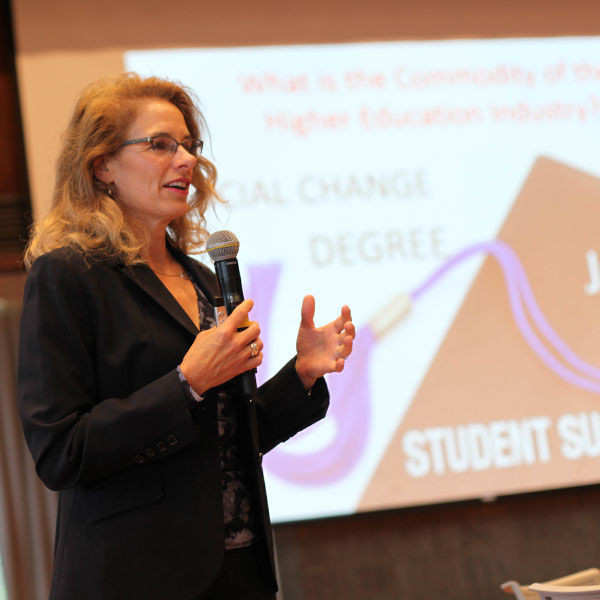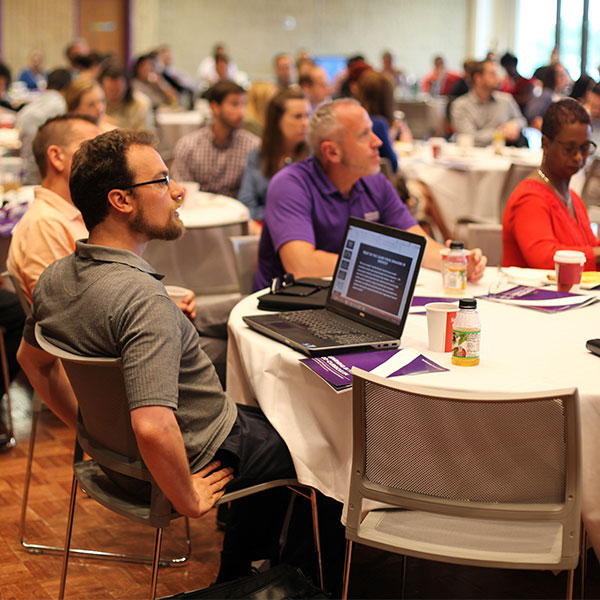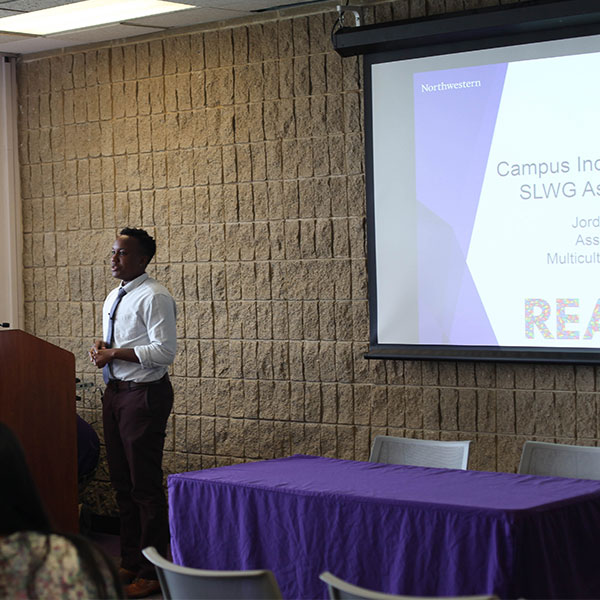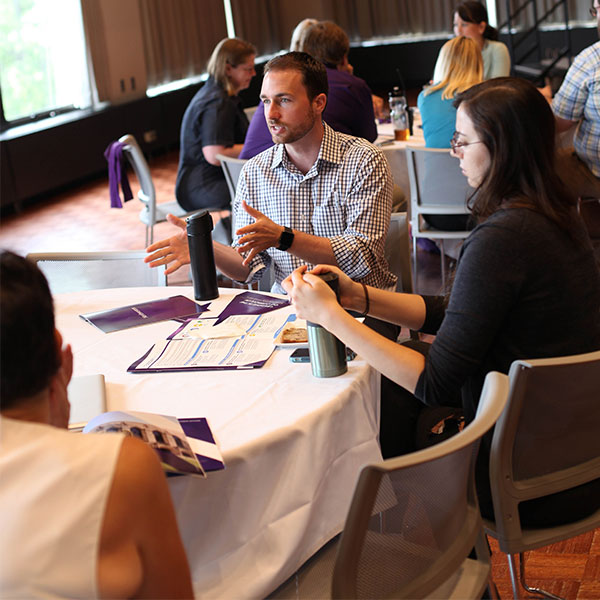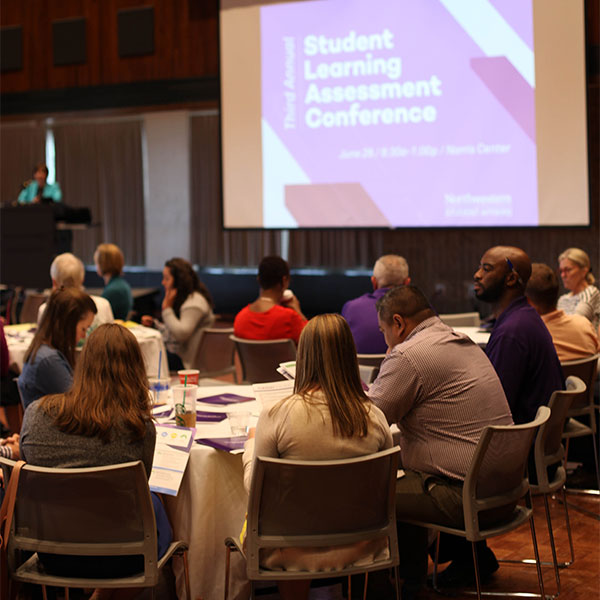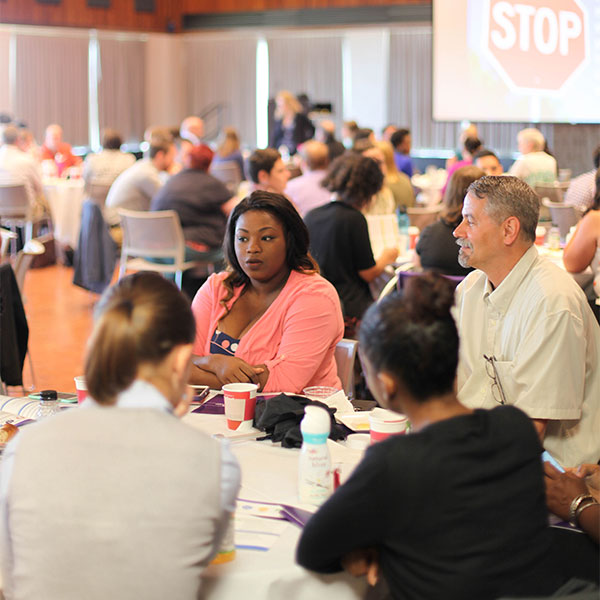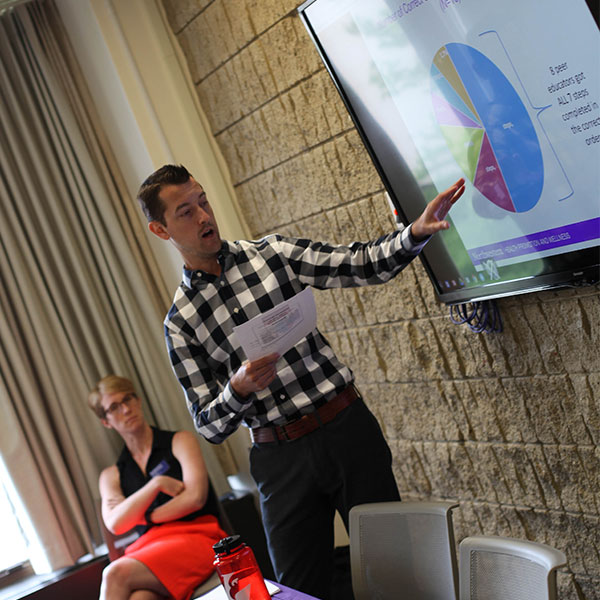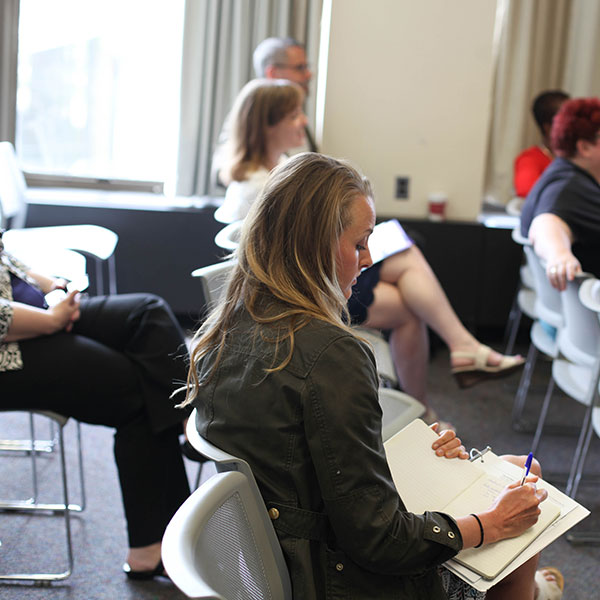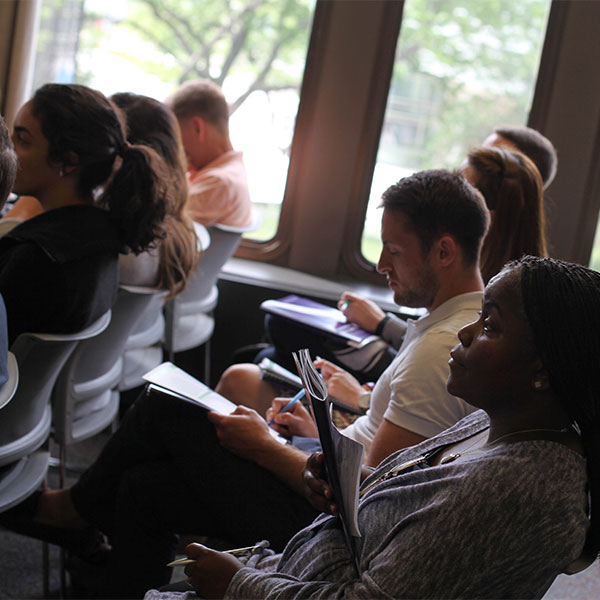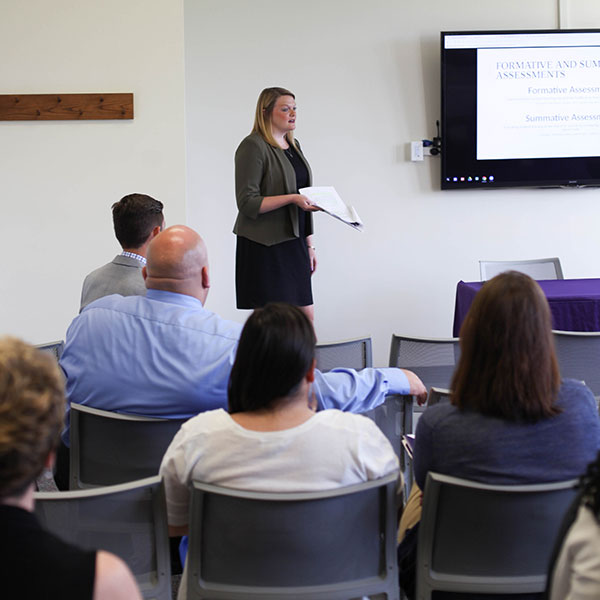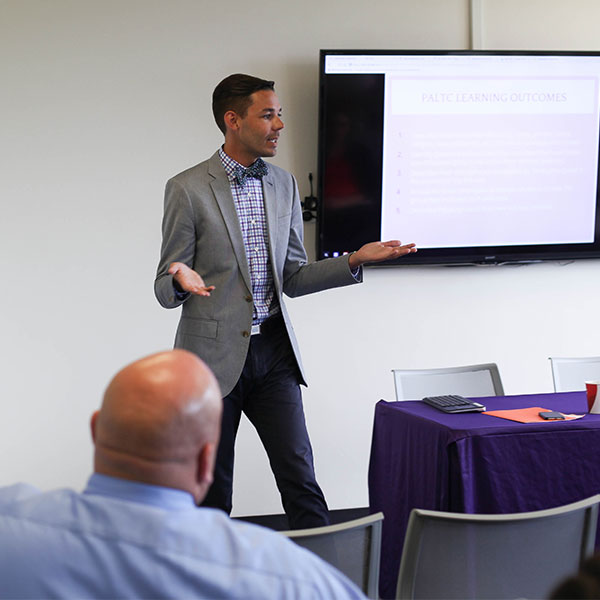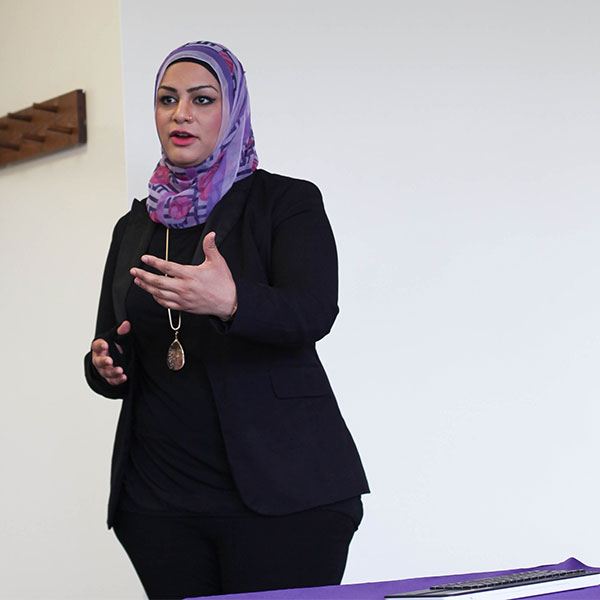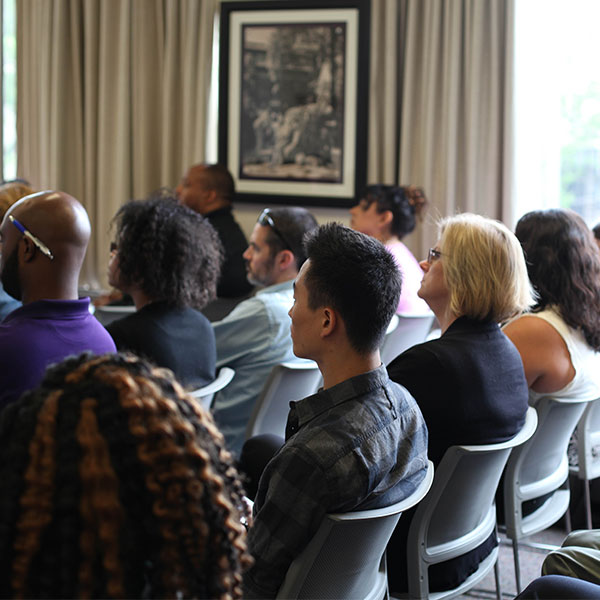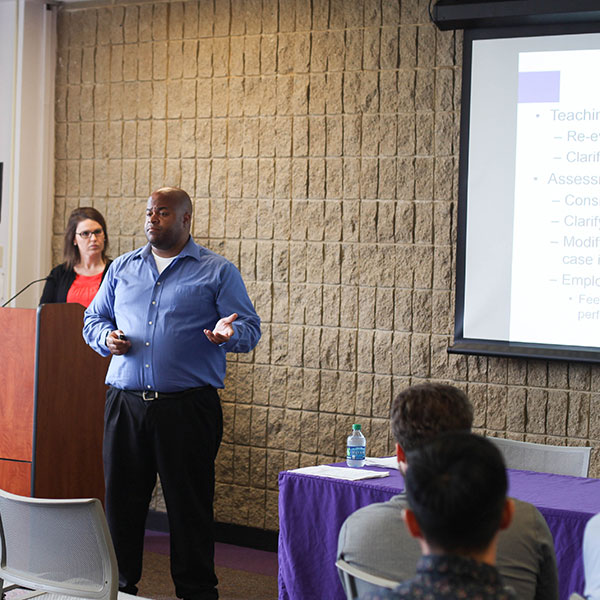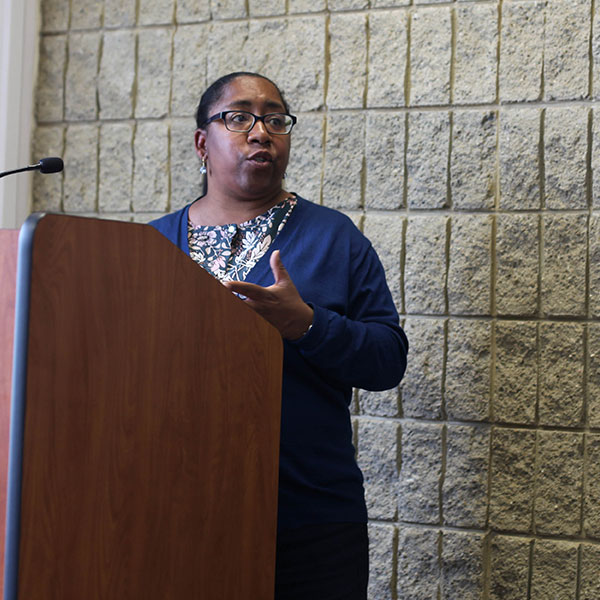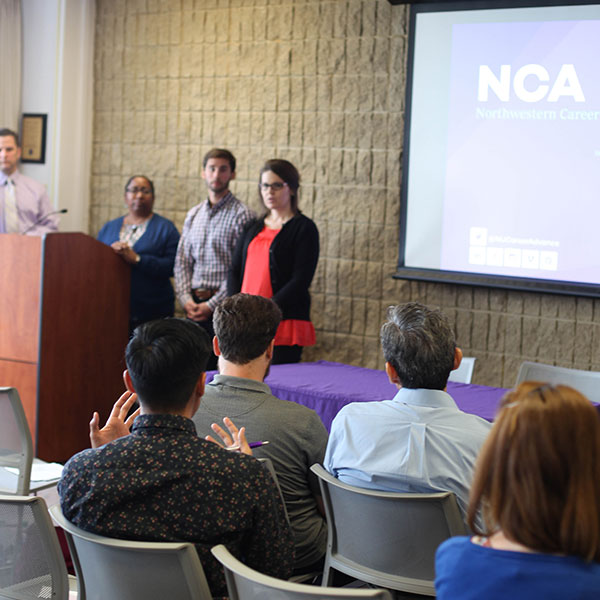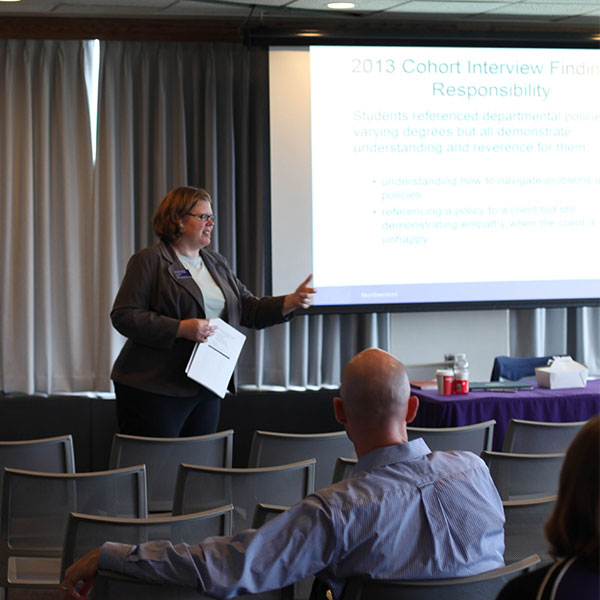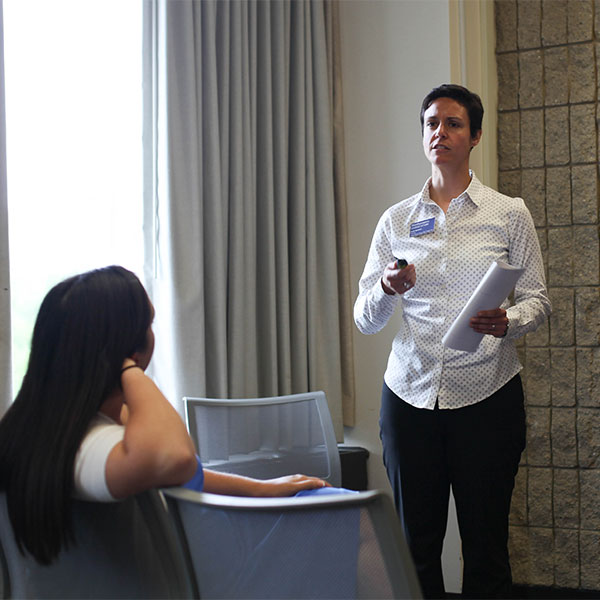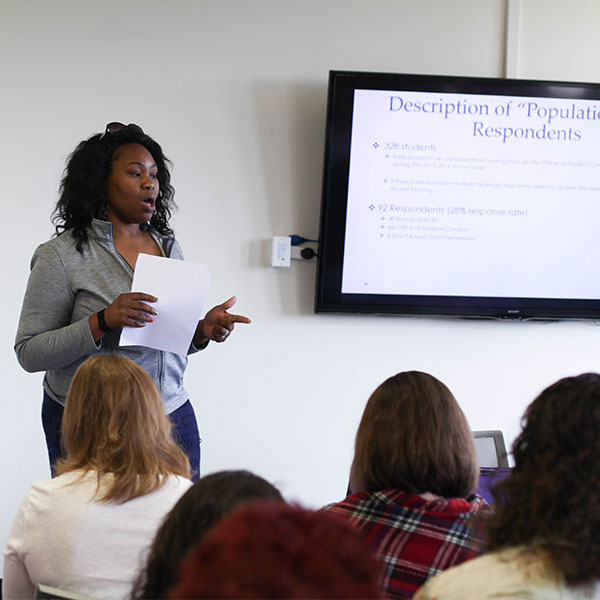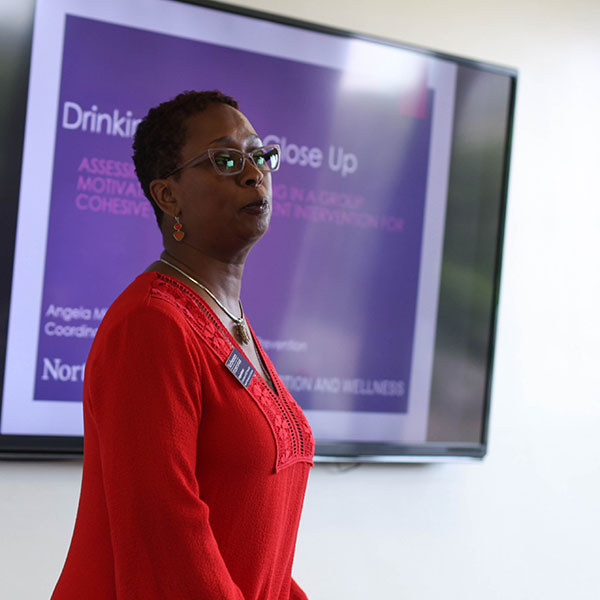2016 Student Affairs Learning Conference
Each Spring, departments showcase their student learning assessment projects at the Annual Student Affairs Learning Conference.
LEARNING IN THE CO-CURRICULUM
Third Annual Student Learning Assessment Conference | June 28, 2016
View Full PDF of 2016 Learning Conference (pdf)
PREPARING OUR STUDENTS TO ENGAGE WITH COMMUNITY
Cory Ferrer | Leadership & Community Engagement
Each year, Northwestern student organizations rely on Campus Life vans to transport hundreds of volunteers to community service sites all over Evanston and Chicago. This fall, the office of Leadership and Community Engagement developed their van training into a pre-service orientation for students engaging in community service, providing an overview of essentials such as professionalism, cultural humility, and risk. Our assessment strategy included a survey that students completed after the orientation and a focus group conducted at the end of the school year that examined co-curricular service practices in student organizations. Findings from this learning assessment will inform future programming for students who believe in giving back.
Related learning outcomes: Social Responsibility, Interpersonal Competence, Personal Development
REAL TALK: LGBTQIA EDUCATIONAL WORKSHOP
Jordan "JT" Turner | Multicultural Student Affairs
With the rise in discrimination against LGBTQIA individuals, there is increased concern nationally for their wellbeing, especially in educational settings. Real Talk is a workshop led by Multicultural Student Affairs staff to engage students in dialogue about how to create LGBTQIA inclusive organizations and learning environments. The workshop includes media, interactive activities, and small group discussion. This assessment project explores student learning in the workshops from Winter Quarter and measures student learning through surveys completed by participants after the workshop. This is an on-going assessment project that will continue next academic year.
Related learning outcomes: Personal Development, Interpersonal Competence, Social Responsibility
STEP UP! BYSTANDER INTERVENTION WORKSHOP
Paul Ang | CARE
Step Up! is a 90-minute bystander intervention skills workshop coordinated by CARE and CIC staff. The workshop presents foundational information about the barriers to intervention, along with strategies to overcome these barriers. The workshop consists of a powerpoint presentation, which is approximately 45 minutes long, and a role playing activity. This length and format was strategically created from a longer version that included a 90-minute presentation with an activity component. Qualitative and quantitative data is being collected to assess this new version of the workshop. The assessment strategy uses paper pre- and post-tests, as well as a 6-month follow-up. Data collection is still in progress, however, an initial overview of the data collected so far and preliminary findings will be discussed.
Related learning outcomes: Cognitive and Practical Skills, Social Responsibility
FRATERNITY & SORORITY LIFE COUNCIL TRANSITION RETREAT
Hallie Moburg Brauer | Fraternity & Sorority Life
Twenty-five students attended the 2016 Fraternity and Sorority Life Council Transition Retreat which was designed to help new council officers (IFC, PHA, MGC, and NPHC) build relationships with one another and develop a clear understanding of the direction in which they would like their positions and council to move over the course of their term. This summative assessment project measured participants ability to write SMART goals, identify their strengths and how they would use them in their new roles, and create a stress management and self-care plan. The methodology included a combination of indirect and direct, and quantitative and qualitative tools.
Related learning outcomes: Cognitive and Practical Skills, Personal Development
ASSESSING LEARNING IN NEW OFFICER TRAINING
ALIGNING INSTRUCTION & ASSESSMENT STRATEGIES IN AN EXISTING PROGRAM
Nancy Anderson & Kerri Howard | Residential Academic Initiatives
Each spring, newly-elected student officers from Northwestern's eleven residential colleges attend a dinner and conference in preparation for their new roles and responsibilities. Building on the insights gained from last year (the first time learning assessment was conducted for this program), this year the New Officer Conference featured changes in both the programmatic content and learning assessment strategy. The goal of these changes was to enhance the educational effectiveness of the conference itself while also calibrating the assessment strategy in order to more accurately measure the student participants learning. As in the previous year, the primary assessment tool was a survey created in CampusLabs and distributed directly to students before and after the New Officer Conference. However, this year both the pre- and post-assessment surveys included multiple-choice Likert-scale questions in addition to open-ended questions. The Likert-scale items added indirect quantitative measures of learning to the existing direct qualitative measures. The scoring process for the qualitative responses was also revised in two significant ways: more nuanced descriptive rubrics replaced last years checklist rubrics, and the final score assigned to each student response was calculated from the average of three ratings, each given independently by a different member of the Residential Academic Initiative staff.
Related learning outcomes: Personal Development, Cognitive and Practical Skills
HOW PREPARED ARE OUR PEER EDUCATORS?
ASSESSING RED WATCH BAND FACILITATOR TRAINING
Kevin Meier | Health Promotion and Wellness
The Red Watch Band Bystander Intervention Training is a peer facilitated program focusing on alcohol emergency situations. Now in its sixth year at Northwestern, the program has been heavily assessed over the years. However, the training of the peer educators who facilitate the program has not been assessed until now. Peer educators attend a 2-day training that includes a half day focusing entirely on the Red Watch Band curriculum. Logistics, expectations, and topic specific content are covered during this time. This year we have taken a look at the knowledge and skill set each peer educator holds before and after they complete facilitator training through a pre-test and post-test. In particular, we explore what our peer educators know about high-risk alcohol emergency situations and how to properly address them. Based on our findings, we were able to identify gaps in our current model and better train our peer educators during annual training while implementing the necessary continuing education opportunities throughout the year.
Related learning outcomes: Personal Development, Social Responsibility, Cognitive and Practical Skills
EDUCATING PEER EDUCATORS: SEXUAL HEALTH AND ASSAULT PEER EDUCATOR TRAINING
Erin Clark | CARE
Peer Educators can be the most powerful messengers for wellness and social norm setting on campuses. But how do we ensure they are sufficiently trained and supported? At CARE we ask our Sexual Health and Assault Peer Educators to go through 50 hours of training on both the content and skills of peer education to become full members in SHAPE. Training is student developed in coordination with CARE staff and involves student-led discussion and expert speakers from both on and off campus. To assess their learning, students who participated in SHAPE Training during Winter Quarter completed both a pre- and post-test. This presentation will cover whether new SHAPE members completed the training with a solid understanding of the core messages around consent, resources, and their roles.
Related learning outcomes: Cognitive and Practical Skills, Interpersonal Competence, Social Responsibility
USING FORMATIVE & SUMMATIVE ASSESSMENT TECHNIQUES IN 2016 RA CLASS
Paul Hubinsky & Erin Boyce | Residential Services
This spring, new RAs participated in a six week training program. One overall learning outcome was measured through this project: As a result of attending the class, new RAs will be able to articulate how their personal and professional strengths and experiences contribute to or influence their ability to build an inclusive and socially just community on campus. Topics included divisional mission and vision, Strengths Quest domains, social justice and inclusion, and building strong communities. The assessment strategy included formative and summative assessment strategies. More specifically, learning outcomes were developed and creatively assessed for each class (formative) and the summative assessment included an oral presentation (rubric) and survey which included self-reported, Likert-scale questions about overall learning.
Related learning outcomes: Personal Development, Social Responsibility
PEER ADVISER LEADERSHIP TRAINING COURSE
Josh McKenzie (for Mayra Garces) | New Student and Family Programs
Peer Advisers (PAs) play an instrumental role in welcoming new students to the Northwestern community. Each PA has a group of new students that they lead and mentor through Wildcat Welcome and the first year. Because of their important role, PAs attend the Peer Adviser Leadership Training Course (PALTC), a 7 week course that supports Peer Advisers in their overall leadership development and increases their understanding of new student needs and the importance of the Peer Adviser position. PALTC provides a space for PAs to reflect on their personal strengths as measured by StrengthsQuest, their social identities, the saliency of those identities in the context of Northwestern, and how those aspects influence their understanding of and role in the new student experience. This learning assessment project explores what PAs learned about themselves and how that information informs their role as a PA. Student learning was assessed at the end of the 7 week course using a survey that consisted of indirect and open ended questions. Findings will be used to inform PA Camp, an additional training that PAs attend prior to Wildcat Welcome, as well as future Peer Adviser Leadership Training Courses.
Related learning outcomes: Personal Development
NORTHWESTERN UNIVERSITY INTERFAITH INITIATIVES: AN INTERFAITH DIALOGUE SERIES
The Northwestern University Interfaith Initiatives (NUii) is a weekly interfaith dinner which seeks to foster community and engage in critical conversation. The interfaith dialogue is inclusive of religious, spiritual, and philosophical pathways which seek to establish meaning and purpose in life. Students are encouraged to share their own narratives and validate the experience of the other. In addition, the dialogue series creates a platform for students to learn more deeply about the intersectionality of their spiritual identities, challenge stereotypes, and explore collaborative action towards issues of shared values and social justice. The assessment strategy used in this project involved reflection and a brief survey.
Related learning outcomes: Personal Development, Social Responsibility
NCA'S MOCK INTERVIEW PROGRAM:
THREE YEARS OF DATA COLLECTION & STUDENT LEARNING
Maggie Smith & Larry Jackson | Northwestern Career Advancement
Northwestern Career Advancement offers mock interview services to students as an opportunity to develop and enhance professional interviewing skills, practice interviewing techniques in a safe space, get feedback on interview skills, and gain confidence about interviewing. After two years of data collection, the mock interview program and assessment instruments were refined to better align with the intended learning outcomes. The assessment techniques and methods have also been revised to more effectively collect data, including incorporating existing technologies. Now in the third year of data collection, NCA is continuing to understand the learning that occurs through the mock interview process and the effectiveness of specific teaching methods.
Related learning outcomes: Personal Development, Cognitive and Practical Skills
ASSESSING ASSESSMENTS:
USING CAREER ASSESSMENTS TO IMPROVE CAREER DECISIONS
Tracie Thomas | Northwestern Career Advancement
One way to assist students with their personal development is to assist them with developing clearer career goals. Helping students to articulate their interests, values, and skills and connect them to careers is often the first step towards alleviating students anxiety about making career choices, whether that is making decisions about majors, internships, or full time employment. In addition, once students learn more about their career interests, they struggle to know the next steps to exploring careers of interest. This learning assessment project demonstrates how two assessments offered by NCA, the Strong Interest Inventory (SII) and the Myers Briggs Type Inventory (MBTI) can help students to learn about themselves and how to apply that information to their career choices. Through individual interpretation of the SII and MBTI, students will be able to identify interests, work activities and values, articulate commonalities among careers of interests, and identify next steps towards career exploration. Student learning was assessed using a paper questionnaire that consisted of open-ended items, and the findings will be used to improve the counseling sessions and future learning assessments of the program.
Related learning outcomes: Personal Development
USING LINKEDIN PRESENTATIONS TO IMPACT STUDENTS' PROFESSIONAL ONLINE PRESENCE & CONFIDENCE
Brett Boettcher & Matt Formica | Northwestern Career Advancement
As the world's largest professional network, LinkedIn helps students develop a professional online presence, build their networks, and identify job and internship opportunities. NCA partnered with the Office of Residential Academic Initiatives and Student Affairs Marketing to teach students how to optimize their profiles and network effectively to support their job and internship search. A total of 70 students participated in 7 LinkedIn presentations in residence halls. Students' LinkedIn profiles were scored using a rubric before and after attending the workshop, and a pre/post survey was used to assess learning and confidence. As an incentive to attend, a free professional headshot was offered.
Related learning outcomes: Cognitive and Practical Skills
STUDENT EMPLOYEE LEARNING: YEAR 3 AT NORRIS
Amy White (for Joe Lattal) | Norris University Center | Student Organizations & Activities
We interviewed third year employees and surveyed all employees to conduct a mixed methods assessment of the Norris Centers learning outcomes for student staff. This learning assessment is in its third year, and several subjects have participated in all three years of data collection. Our presentation describes the development of program and activity-level learning outcomes for student employees specifically, methodology improvements to align with new outcomes, data summary, and themes and findings as well as strategies for assessing learning among your department's employees.
Related learning outcomes: Cognitive and Practical Skills
STUDENT EMPLOYEE LEARNING FROM THE ALUMNI PERSPECTIVE
Jackie Grinvalds | Norris University Center
The purpose of the assessment project was to better understand learning through student employment at the Norris University Center and how it impacts postgraduate experiences. Alumni were contacted to share their experiences, reflect on what they learned from working at Norris, and describe how it applies to their employment since graduation. Respondents' graduation years range from 1979 to 2013, and the alumni held a variety of positions in the Norris Center. To gather evidence of learning, used a mixed methods approach by surveying and interviewing alumni. The data provide insights into how graduates apply
their learning to employment after college and help inform how we can continue to prepare student employees for postgraduate success.
Related learning outcomes: Cognitive and Practical Skills
STUDENT LEARNING ON ALTERNATIVE BREAK TRIPS
Kelly Benkert | Leadership & Community Engagement
The ASB alternative break program engages nearly 200 students per year in week-long service-learning experiences in cities across the country. As Leadership & Community Engagement works to support this student organization, we engaged the student leaders in a process to identify learning outcomes and develop an assessment plan. ASB participants completed a post-trip survey consisting mostly of open-ended questions to directly measure learning, and 15 participants volunteered to share their reflective journals with us. We are excited to work with next year's leaders to use this data to build upon the strengths of the program to maximize student learning.
Related learning outcomes: Social Responsibility, Interpersonal Competence, Personal Development
PROJECT WILDCAT: LEARNING IN THE WILDERNESS
Adrian Bitton | Leadership & Community Engagement
Project Wildcat is a transformative eight-day pre-orientation program that serves 180 new students each year. These new students are divided into smaller groups and led by paired teams of counselors through the Superior Hiking Trail in Northern Minnesota on a backpacking and camping adventure. Through on-going conversations during hikes and nightly reflections, new students learn about life at Northwestern and build lasting friendships with one another. Formal assessment tools such as personal reflection journals and post-experience surveys capture the powerful impact on personal development, interpersonal competence including the ability to work with people from different backgrounds, and cognitive and practical skill development. Project Wildcat counselors also learn about data-driven decision making and the role of qualitative and quantitative assessment in the program planning process by using these feedback mechanisms as training tools during their counselor training process.
Related learning outcomes: Personal Development, Interpersonal Competence, Cognitive and Practical Skills
FRESHMAN URBAN PROGRAM: STUDENT LEARNING THROUGH CIVIC ENGAGEMENT
Val Buchanan | Leadership & Community Engagement
The Freshman Urban Program is a pre-orientation experience for incoming students, led by Sophomore-Senior Northwestern students, to engage with the Chicago community through community service. The program includes lectures from faculty and neighborhood explorations lead by community leaders and activists as well as time for students to reflect on their service and community engagement experiences in small groups. This assessment project used a survey conducted six weeks after the 2015 program to explore student learning and the components of the program that participants felt most contributed to their learning.
Related learning outcomes: Social Responsibility, Interpersonal Competence, Personal Development
LEARNING THROUGH THE STUDENT CONDUCT EXPERIENCE
Stella Okeke | Student Conduct
This assessment project explored what students are learning through the student conduct experience, and more specifically, through administrative hearings. A survey was sent to 328 students, primarily undergraduates, who were found responsible for violating University policy through participation in an administrative hearing during 2015 & 2016. The survey included both self-reported, Likert-scaled items and open-ended questions where students reported and gave examples of what they learned.
Related learning outcomes: Personal Development, Interpersonal Competence, Social Responsibility
DRINKING CULTURE CLOSE UP
Angela Mitchell | Health Promotion and Wellness
Drinking Culture Close Up is a program for student organizations, athletic teams, or other formed groups to safely identify and discuss both the positive and negative attitudes and impacts of the groups drinking behaviors. The discussion is facilitated by HPaW staff with the use of an anonymous survey that is completed by members of the group prior to the program and provides participants with an opportunity to hear their peers honest opinions and may open the door for conversation about whether and if so, how to make adjustments in their drinking culture. Student learning through Drinking Culture Close Up was assessed through a post-survey and a rubric completed by the two program facilitators.
Related learning outcomes: Social Responsibility, Interpersonal Competence
Past Annual Conferences
- 2015 Learning Conference
- 2014 Learning Conference
